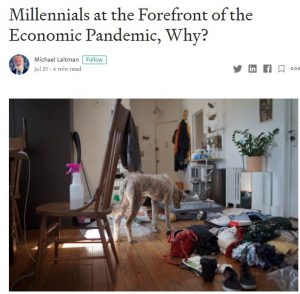
While the elderly are much more vulnerable to the coronavirus disease, the brunt of the economic pandemic certainly has a young face. Millennials in America and around the globe face a particular economic upheaval due to massive job losses in the service-related industries that provided their main source of income. This is no coincidence; the hardship comes as a call to action for the new generation to lead the world to a more promising future by rebuilding the old, failed economic and social systems.
The crisis demands a new education for a new lifestyle based on the same laws of mutual support and reciprocity that exist in nature.
For millennials — those born between 1981–1996 who are now 24–39 years old — the coronavirus epidemic has been especially harsh. They had not fully recovered from the 2008 financial crisis before being hit hard by this new crisis caused by COVID-19. Their limited savings affect their capacity to weather the crisis. A recent study revealed that 76% of surveyed millennials said their household income has been negatively affected by the pandemic, making them the hardest hit demographic and one struggling to cover their most basic needs.
The coronavirus pandemic has revealed how our current economic system founded on destructive competition at the expense of others leaves large swaths of society vulnerable and in danger of crumbling into dust in the blink of an eye. It shows how our current structures do not offer young people what they need to prosper. Feeling discouraged and frustrated, they see no future within such systems.
The millennials will be the pioneers, and they need to realize that all this upheaval is happening to them specifically to push them to take their future in their own hands and start creating a new and better world for everyone.
Although we may not yet grasp it, a huge change in reality is now underway. The pandemic has placed on the shoulders of a new generation of young people, one now suffering greatly, a special role and responsibility to build a new social structure that fosters stable connections above all the differences and disparities in society for the benefit of all.
Millennials beg to be heard, but we do not know how to listen since our generation still operates according to old paradigms. Until now, the careless patterns of human interactions that permeated our economic and social systems have created a vast chasm between the generations. To make matters worse, we have failed to build an educational system that is suitable for them. We have built a narrow and conflicted worldview around us that divides the world and forces everyone to fend for himself and compete with others at all cost.
The crisis demands a new education for a new lifestyle based on the same laws of mutual support and reciprocity that exist in nature.
A new wind is blowing in the world, changing orientation and old ways. Young people are sucked into a whirlpool of despair, the depths of which will push them to anchor on new safe shores. The safeguard and life-buoy in this scenario must be the tenet “love thy neighbor as thyself,” the most important principle for reaching endless fulfillment — the kind of perfection every human being aims at, and which is achievable only when all the contradictions within man connect in the mind and in the heart.
Meanwhile, the young generation fights a war for survival. We have yet to realize that something in reality is resetting, the old world is dying and a new one is being born. The change is rapidly evolving, so we have to hurry to keep up by quickly opening many courses and education centers to help young people transition smoothly between the two worlds. The millennials will be the pioneers, and they need to realize that all this upheaval is happening to them specifically to push them to take their future in their own hands and start creating a new and better world for everyone.
It would be wise on the part of countries and nations to provide young people with alternative shelters in hotels and sponsor studies in how to survive in a new world that is founded on improved social relations and more balanced systems. Teach the young pioneers how to be citizens, not in the sense of habitants of a specific country but as builders of a new human society, founded on good connections that encircle everyone in brotherhood. From these young citizens tomorrow’s leaders will emerge. They will understand what forms the new state should take, what connections should prevail among people, and how to educate new generations. They will create a good and beautiful atmosphere that the entire society will enjoy.
This is the time for millennials to exert leadership by uniting all factions of society and merging them into one system with a common vision — a vision that America and the world needs for this generation and for those to come.
[Reuters photographer Nora Savosnick packs her belongings as she prepares to travel back to her family home in Norway, where she will then self-isolate in quarantine for 14-days, during the coronavirus disease (COVID-19) outbreak, in New York, U.S., March 15, 2020. “It’s very strange not being able to see friends and to only live with my mum and my dad at the age of twenty four. And, it’s just a huge contrast from my life from New York as well. Oh, God, it’s just two different worlds,” said Savosnick. REUTERS/Nora Savosnick]
Featured in Medium, Facebook, KabNet, LinkedIn, Thrive Global